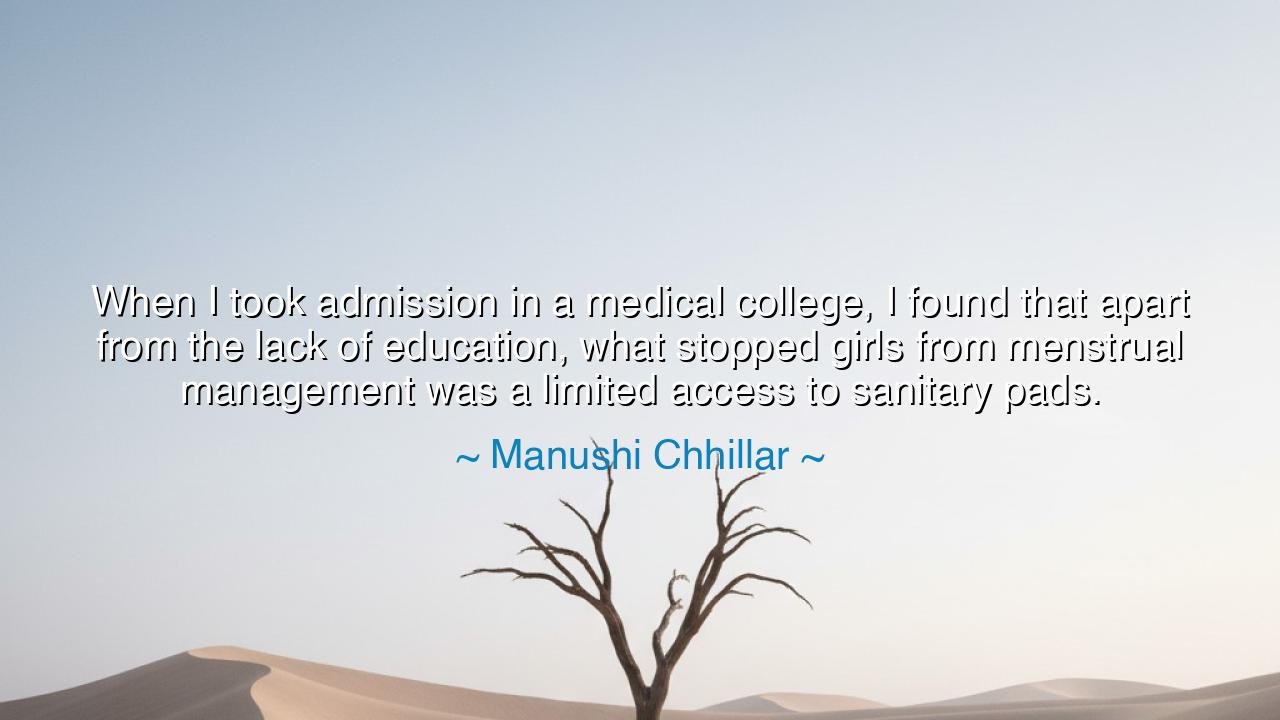
When I took admission in a medical college, I found that apart
When I took admission in a medical college, I found that apart from the lack of education, what stopped girls from menstrual management was a limited access to sanitary pads.






“When I took admission in a medical college, I found that apart from the lack of education, what stopped girls from menstrual management was a limited access to sanitary pads.”
Thus spoke Manushi Chhillar, a healer of the body and a champion of dignity, whose words shine with both compassion and courage. Beneath the simplicity of her statement lies a profound truth — that the measure of a society’s progress is not found in its wealth or its towers, but in how it treats the most natural realities of human life. Her voice, soft yet unyielding, carries the same spirit that once moved sages and reformers: to unveil the hidden pain, to confront the silence that binds half of humanity in unnecessary shame.
The origin of these words lies in the early years of Manushi’s journey through medical college, where she entered not only to study anatomy and science, but to understand the deeper ailments of her people. In her clinical halls, she saw not merely disease but disparity — how women and girls, especially in rural India, were held back not by destiny, but by neglect. She discovered that the obstacle to menstrual hygiene was twofold: the lack of education, which cloaked menstruation in taboo and secrecy, and the limited access to sanitary pads, which turned a basic biological function into a source of suffering. In that revelation was born not pity, but purpose.
The ancients would have understood her struggle well, for across time and civilization, ignorance has been the first chain of bondage. In many cultures, the sacred and the natural have been obscured by superstition. The menstrual cycle — once honored by early tribes as the rhythm of creation — became, in later ages, a cause for exclusion and silence. Manushi’s insight pierces through centuries of inherited stigma, reminding us that the body is not impure, but divine; that to deny girls their right to manage menstruation with dignity is to deny them their place in society itself.
Her compassion echoes the work of Arunachalam Muruganantham, the humble inventor from Tamil Nadu known as the “Padman” of India. Like Manushi, he recognized that millions of women suffered in silence, using unsanitary materials during menstruation. Ridiculed and ostracized for his efforts, he persisted, creating affordable sanitary pads and empowering women through education and employment. His journey, like hers, reminds us that real change begins with empathy — with the courage to see what others choose to ignore. Both stories reveal that the healer’s first duty is not to treat illness, but to restore dignity.
When Manushi speaks of “limited access to sanitary pads,” she is not merely describing a material scarcity — she is naming a moral failure. For what she witnessed was not just poverty of resources, but poverty of awareness. She saw how girls missed school, how they withdrew from society, how dreams dimmed beneath the weight of shame — all because of a silence maintained by culture and convenience. Her words, then, are not only about hygiene; they are about freedom — the freedom to live without stigma, to learn without interruption, to walk without fear. In speaking this truth, she reclaims a power long forgotten: that education is not complete until it liberates.
There is in her statement a quiet heroism. As a medical student, she could have confined herself to textbooks and examinations, but instead she chose to look beyond the hospital walls and into the heart of human suffering. She saw that medicine is not only the science of the body, but the art of compassion — that to heal the world, one must begin where pain is hidden. Her recognition that menstrual management is not a luxury but a necessity reflects the eternal law of justice: that every human being, regardless of gender or wealth, deserves access to health, knowledge, and respect.
The lesson of her words is clear and timeless: do not turn away from the simple injustices, for they are the roots of greater inequality. Let every teacher, parent, and policymaker remember that progress begins with awareness, and awareness must be followed by action. Speak openly of what has long been whispered; provide the means where there has been denial. Support initiatives that bring menstrual products to those who cannot afford them. Teach young boys and girls alike that menstruation is not a curse, but a sign of life itself.
So, my listener, let this truth sink deep: to uplift a nation, one must first uplift its women, and to uplift women, one must destroy the walls of silence that confine them. Manushi Chhillar’s revelation is both a diagnosis and a prescription — she has seen the wound and pointed to the cure. It calls upon each of us to act not as bystanders, but as healers, engineers, and educators in the temple of humanity. For when every girl walks in dignity, when no woman hides her pain, when the natural becomes noble once again — then, and only then, shall we call ourselves truly civilized.






AAdministratorAdministrator
Welcome, honored guests. Please leave a comment, we will respond soon